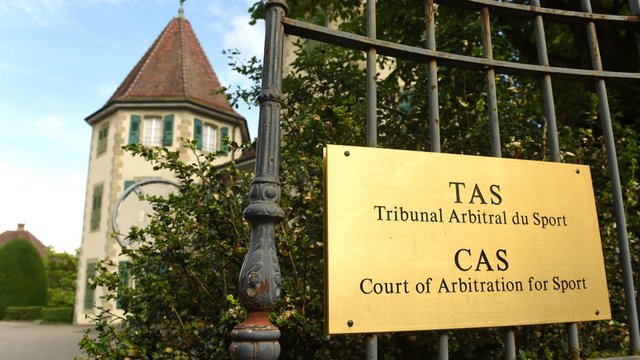
What is the Court of Arbitration for Sport?
Edited on May 28, 2024

The Court of Arbitration for Sport (CAS) is an international institution that acts as a neutral and independent mediator to resolve sports-related disputes. It is often referred to as the "supreme court of sport", as it is one of the main meeting points between the worlds of law and sport.
If you are interested in this combination of disciplines, you may want to specialise in a master's degree. The Master in Sports Law at Escuela Universitaria Real Madrid is a great option for this. But first, let's take a look at the functions of this institution.
The Court of Arbitration for Sport: An overview
The Court of Arbitration for Sport was founded in 1984 by the International Olympic Committee (IOC), then chaired by Juan Antonio Samaranch, in Lausanne, Switzerland. Its emergence came at a time when sports disputes were on the rise and a neutral mechanism was needed to deal with them.
Over the years, CAS has played a crucial role in promoting integrity and fair play in sport. CAS decisions set important precedents that influence the interpretation of sporting regulations around the world. In addition, CAS protects the rights of athletes, and provides a mechanism to appeal decisions affecting their eligibility, disciplinary sanctions and other aspects of their careers.
Decisions of this body are final and binding and are not subject to appeal except in very limited circumstances. This provides a quick and final resolution to sporting disputes at the international level.
How does the Court of Arbitration for Sport work?
The CAS is composed of several bodies that collaborate in the process of resolving sporting disputes.
- Court of Arbitration: The Court of Arbitration is the main body responsible for resolving sports disputes. It is composed of independent arbitrators, sports lawyers and other sports law experts from around the world.
- Specialised divisions: such as the Court of Arbitration for Olympic Sport (CAS-O) and the Court of Arbitration for Football (CAS-F). These divisions are made up of referees with expertise in the sport in question.
- Appeals Committee: reviews decisions made by the Court of Arbitration in appeal cases. It is also composed of independent arbitrators.
- CAS Secretariat: is responsible for administering the proceedings and supporting the arbitrators in resolving disputes. It provides logistical, legal and administrative assistance throughout the process.
Type of disputes resolved by CAS
The Court of Arbitration for Sport has jurisdiction over a wide range of sport related matters:
Sport doping
This type of case includes appeals against doping sanctions, disputes over test results, and the interpretation and application of anti-doping regulations.
CAS played an important role in the Lance Armstrong case. The cyclist was stripped of his seven Tour de France titles in 2012 when doping sanctions by the United States Anti-Doping Agency (USADA) were upheld.
Contractual disputes
This may include disputes between athletes and sports clubs, agents, sponsors or other parties. For example, in cases involving player transfers or sponsorship contracts.
A recent case is that of football player Neymar Jr. with Barcelona. In 2017 Neymar left Barcelona to join Paris Saint-Germain (PSG) and his former team alleged breach of contract. However, CAS ruled that the player had not breached his contract and therefore the compensation sought by the Catalan club was not justified.
Disciplinary disputes
CAS resolves cases of disciplinary sanctions imposed on athletes, coaches, teams or sports federations for violations of sporting rules and regulations.
In 2016, Russian tennis player Maria Sharapova used the Court to appeal a sanction. She was facing a two-year suspension by the International Tennis Federation (ITF) after testing positive for meldonium during the Australian Open. After evaluating the evidence, CAS reduced the suspension to 15 months, concluding that while Sharapova was not diligent in checking for updates to the banned substances list, her violation was not intentional.
Eligibility and participation in sporting events
This includes disputes over nationality, residency, age and other selection criteria for participation in sporting competitions.
An illustrative case was that of South Africa's Caster Semenya in 2019. She challenged the International Association of Athletics Federations (IAAF) regulations on testosterone levels in female athletes. The case sparked a debate about athletes' rights and fairness in sport.
Disputes between sports federations
The CAS handles disputes between federations, such as disputes over rights to organise events, revenue sharing, or interpretation of sporting rules and regulations.
Perhaps the most famous dispute is the one that occurred in 2016 between the International Basketball Federation (FIBA) and the NBA Players Association (NBPA). FIBA implemented a new regulation that prevented professional players from participating in international competitions if they were subject to contracts with the NBA that allowed them to represent their countries in tournaments such as the Olympic Games.
The NBPA challenged this regulation and CAS ruled in its favour. This court decision overturned the regulation and allowed players to participate in international competitions without restrictions.
Disputes related to the Olympic Games
The CAS also resolves cases related to athlete eligibility, organisation and conduct during the Olympic Games.
A high-profile example occurred when CAS decided to exclude the Russian athletics team from the 2016 Rio Olympics due to allegations of institutionalised doping. This decision had a significant impact on world sport.
As we see in this case, the world of sport is linked to a large number of professional disciplines. From medicine to marketing to management, you can find sport-related careers in many different sectors. If you are interested in working in the sports industry, Universidad Europea has a wide variety of Real Madrid programmes where you can choose the one you like best.
Article published on April 10, 2024